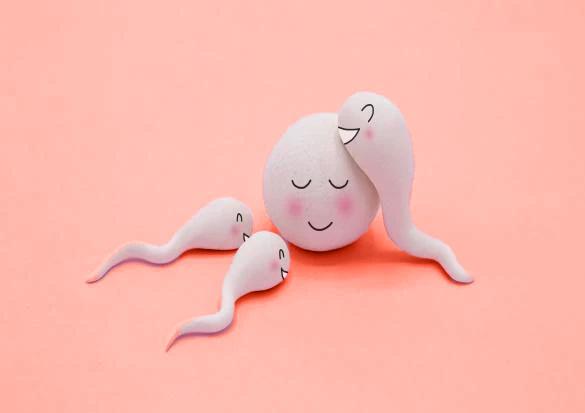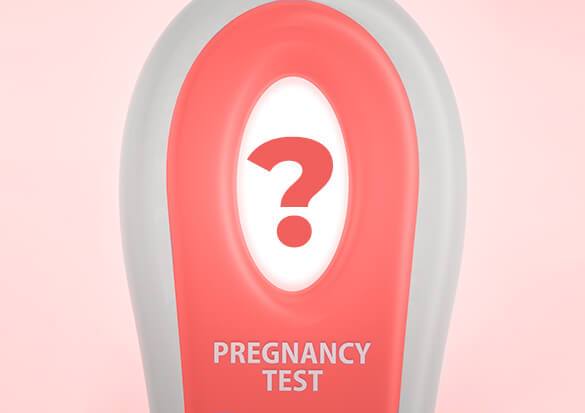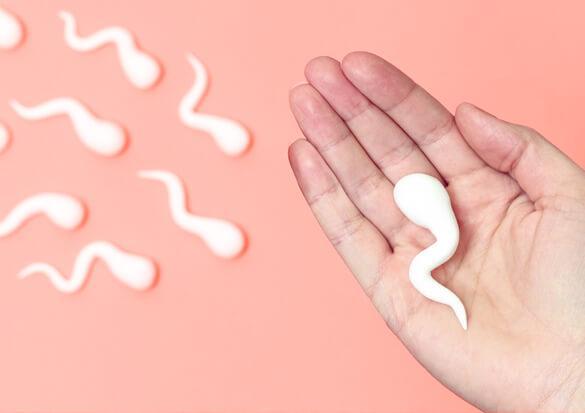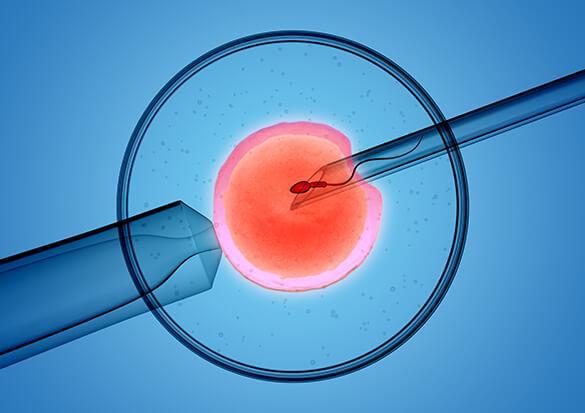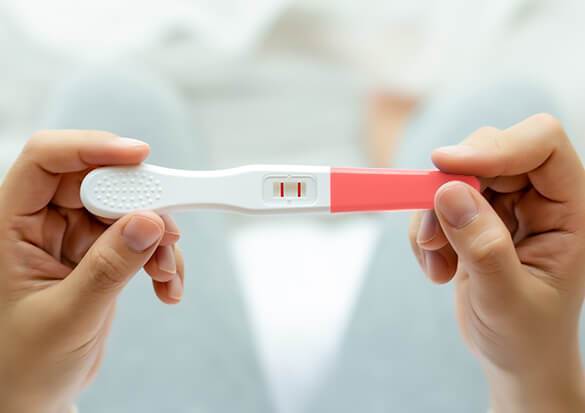What are the main causes of female infertility?
Do you know the underlying conditions that can cause female infertility? We discuss some of the most common reasons why you may be struggling to conceive.
Most couples who have regular sex without contraception will get pregnant within a year. However, for some people, it can take longer.
Some lifestyle factors can impact female fertility. If you have not conceived after a year of trying [1], then it’s a good idea to talk to your doctor.
We look at the most common causes of female infertility, including:
- Unexplained infertility
- Thyroid conditions
- Polycystic ovary syndrome (PCOS)
- Blocked fallopian tubes
- Endometriosis
- Uterine abnormalities
- Premature ovarian insufficiency (POI)
- Medication and drugs
- Infrequent sex
1. Unexplained infertility
Infertility is generally defined as not being able to get pregnant (conceive) after one year of regular unprotected intercourse.
If you have been trying for a baby for more than a year without conceiving, or you are over 35 and have been trying for over six months, your doctor may run a standard infertility evaluation.
Couples who receive normal results on the standard infertility evaluation are assigned a diagnosis of unexplained infertility. Although estimates vary, the likelihood that all test results for an infertile couple are normal (ie, that the couple has unexplained infertility) is approximately 15% to 30% [2].
Unexplained infertility means doctors cannot find any known cause for your difficulty in conceiving. Though it may be reassuring to know that everything seems healthy, some couples may find this diagnosis frustrating as there is nothing to fix to help improve their fertility.
Some doctors believe that there is no such thing as unexplained fertility, and it is just that we don’t yet have the technology to identify the problem. It is likely that as our scientific knowledge develops and our techniques and treatments improve, the diagnosis of unexplained fertility will become less frequent.
Most couples with unexplained infertility, who don’t go on to conceive naturally, will be offered fertility treatments to help conception.
2. Thyroid conditions
The thyroid is a small butterfly-shaped gland that sits at the front of the neck, either side of the windpipe or trachea. The thyroid produces hormones that affect almost every cell in the body, and without thyroid hormones, the body would be unable to convert nutrients into energy.
There are numerous thyroid conditions, and as many as one in 20 people have either an underactive or overactive thyroid [3].
Thyroid conditions are common reasons why some women may find it difficult to conceive or maintain a pregnancy.
Women with a thyroid disorder may find it difficult to conceive as the disruption in hormones can disrupt their menstrual cycle and ovulation. If you have a thyroid condition, you may be experiencing other symptoms alongside a disruption in your menstrual cycle.
Symptoms of an underactive thyroid include:
- Low body temperature
- Tiredness
- Weight gain
- Slow pulse rate
- Goitre (protruding thyroid)
- Menstrual cycle disturbances – longer periods, heavier periods, or absence of periods
- Infertility or recurrent miscarriage
- Low libido
- Depression
- Memory loss
- Slow metabolism
- Dry skin and hair
- Hair loss
Symptoms of an overactive thyroid include:
- Nervousness, anxiety, and irritability
- Mood swings
- Difficulty sleeping
- Tiredness and weakness
- Menstrual disturbances – lighter, irregular periods
- Infertility
- Sensitivity to heat
- Swollen neck (goitre) from an enlarged thyroid gland
- Irregular heartbeat or palpitations
- Twitching or trembling
- Weight loss
If you are struggling to conceive, have had early miscarriages, or notice any of the symptoms listed above, you should speak to your doctor about the possibility of a thyroid-related condition.
Your doctor can take a full thyroid function test to check the levels of your thyroid hormones. If you wish to check your thyroid function from the comfort of your home, then have a look at an Advanced Thyroid Function Blood Test finger-prick sample.
If you are diagnosed with a thyroid condition, you will be given treatment and could go on to conceive naturally [4].
Read more about the causes of thyroid-related conditions in our Thyroid Guide.
3. Polycystic Ovary Syndrome (PCOS)
PCOS is a common hormonal condition among women of childbearing age and affects up to one in ten women in the UK [5].
Eggs in the ovaries of women with PCOS don’t always develop as they should, forming tiny cysts which disappear, only to be replaced by more cysts.
PCOS is a chronic condition, and although the cysts are not dangerous and do not go on to form ovarian cancer, or need surgical removal, they can impact lots of areas of a woman’s life, including her ability to get pregnant.
Women with PCOS may have hormone imbalances which can mean that their eggs don’t mature properly. The imbalance can lead to periods becoming erratic, making it difficult to pinpoint if, or when, ovulation occurs [6].
The good news is that many women with PCOS can go on to have successful pregnancies – it might just take a bit longer, and you may need help from a doctor or fertility specialist.
If you think you may have PCOS, or want to understand more about your condition, you can either speak to your doctor about blood tests or purchase your own at-home Polycystic Ovary Syndrome Blood Test.
For more information about PCOS symptoms, treatment, and what it may mean for your fertility, see our PCOS Guide.
4. Blocked fallopian tubes
Blocked fallopian tubes are one of the leading causes of infertility, with one in five cases of infertility being put down to having blocked fallopian tubes [7].
The fallopian tubes are where eggs and sperm meet for fertilisation and play a crucial role in reproduction. Once fertilised, the embryo travels down the fallopian tube and implants in the uterus. However, if you have a blocked, or damaged fallopian tube, the embryo may not be able to make the journey down to the uterus and implant itself in the womb.
There are no other symptoms of blocked fallopian tubes but having a sexually transmitted infection (STI) increases the risk. Due to scarring that can occur from some sexually transmitted infections (STIs), chlamydia, and gonorrhoea are the most common causes of blocked and damaged fallopian tubes.
Other factors that increase your risk of blocked fallopian tubes include [8]:
- A history of pelvic infection
- A previous burst appendix
- Endometriosis
- A history of abdominal surgery
If you are at high risk, it is recommended to discuss the possibility of blocked fallopian tubes with your doctor.
An ultrasound scan and investigative surgery can diagnose you with abnormalities you may have with your fallopian tubes.
If an abnormality of the fallopian tubes is causing infertility, it is known as tubal factor infertility [9].
5. Endometriosis
According to the charity Endometriosis UK, one in ten women have a diagnosis of endometriosis [10].
On average, it can take up to seven years for a woman to be diagnosed, as many symptoms are similar to other conditions such as irritable bowel syndrome (IBS).
Endometriosis is a condition where tissue, which is similar to the lining of the womb, starts to grow in other places, such as the ovaries and fallopian tubes [11]. It can cause a chronic inflammatory reaction and may lead to the formulation of scar tissue within the pelvis.
Endometriosis is a long-term condition that can run in families. It can be painful and debilitating and may impact significantly on your life.
The symptoms of endometriosis can vary. Some women are severely affected, while others may not have any noticeable symptoms.
The main symptoms of endometriosis are:
- Abdominal or back pain
- Pain in the legs and chest
- Extremely painful periods
- Pain during or after sex
- Pain when urinating or opening your bowels
- Nausea, constipation, diarrhoea, and blood in the urine
- Infertility
- Chronic fatigue
- Depression
Investigations and treatment for endometriosis are available, and many women go on to conceive successfully.
If you are concerned about endometriosis or are experiencing any of the symptoms above, we recommend that you speak to your doctor.
To find out more about endometriosis, visit our all you need to know about endometriosis blog.
6. Uterine abnormalities
Women between the ages of 30 and 50 are most likely to be affected by an abnormality of the uterus [12].
When there is an abnormality with the uterus, it is often referred to as a uterine abnormality.
Several uterine abnormalities can impact fertility. Usually, though, you wouldn’t be aware of any problems until you are unsuccessful in trying to conceive naturally.
Common uterine abnormalities
1. Fibroids
Fibroids are one of the most common abnormalities of the uterus and affect one in three women [13].
Fibroids are non-cancerous growths that develop in or around the uterus. The growth is made up of muscle and fibrous tissue and can vary in size. Many women are unaware they have fibroids as they don’t always present with symptoms. Even so, one in three women experiences symptoms.
Symptoms of fibroids include:
- Heavy periods or painful periods
- Tummy (abdominal pain)
- Lower back pain
- A frequent need to urinate
- Constipation
- Pain or discomfort during sex
Small fibroids may not pose a problem for your fertility, but your doctor may recommend surgical removal of a fibroid if it is lying where an embryo would typically implant.
In the case of large fibroids, medication may be given to help shrink them. If this medication is unsuccessful, then surgery to remove the fibroids may be required.
2. Septate uterus
Another anatomical uterine abnormality is known as a septate uterus. A septate uterus is where a wall of muscle down the centre of your uterus splits the uterus in two. Sometimes, the wall only comes part-way down the womb (sub-septate) and other times it comes the whole way down (septate).
Women with sub-septate or septate wombs are at a higher risk of early miscarriage and preterm birth and are more likely to have difficulties conceiving.
3. Other uterine abnormalities
Other anatomical abnormalities of the uterus such as bicornate, unicornuate, arcuate, or didelphic uterus, are less likely to affect conception but can increase the risk of miscarriage and premature birth.
7. Premature ovarian insufficiency (POI)
POI is also known as premature or early menopause and is the term used when your ovaries stop working earlier than usual.
The average age for menopause is 55, but POI occurs in 1% of women under the age of 40 and, though rare, can affect women in their 20s and 30s too [14].
POI diagnosis can take some time, especially if you are young. It can often be misdiagnosed as other conditions such as PCOS. High levels of FSH can indicate that your ovaries are not working as they should. However, FSH can be erratic in the early stages of POI, which is why it can sometimes be difficult to diagnose.
In young women, including teenagers, their periods may not start at all, while in other women, their periods may become irregular and eventually stop altogether.
A Female Hormone Blood Test measures the levels of female hormones, including FSH, and thyroid hormones in your blood which regulate fertility, mood and energy.
Other symptoms of POI can include:
- Infertility
- Hot flushes and night sweats
- Insomnia and disturbed sleep
- Palpitations
- Weight gain (especially around the waist and abdomen)
- Skin and hair changes (dryness, thinning)
- Headaches
- Breast tenderness
- Mood swings and irritability
- Anxiety/panic attacks
- Loss of self-esteem
- Lowered libido
- Difficulty concentrating and memory lapses
- Fatigue/low energy levels
- Joint/muscle pain
- Vaginal dryness and urinary tract infections
- Depression
If you have a diagnosis of POI, then your best chance of conceiving may be with a donor egg and IVF. You can find out more about egg donation in our section on what treatments will help me conceive.
Finding out that you can’t have biological children may be an emotional time. But the best thing is to take time to consider your options and do what feels right for you and your partner. You can find information on support available on our page on what is infertility.
8. Medication and drugs
The side effects of some types of medicines and drugs can negatively affect your fertility.
If you are concerned about any medication you are taking, talk to your doctor, but do not stop taking any prescribed medication until after seeking medical advice.
Common medications and drugs that may affect your fertility are:
- Non-steroidal anti-inflammatory drugs – Long-term use or high doses of ibuprofen and aspirin may make it more difficult to conceive.
- Chemotherapy – In some cases, chemotherapy can cause ovarian failure. Egg freezing may be offered to women who wish to have a family before starting treatment.
- Neuroleptic medication – Medications used to treat psychosis can sometimes cause difficulty in conceiving.
- Spironolactone – This can be used as a treatment for conditions such as oedema, heart failure, and resistant hypertension and can impact fertility [16]. However, this generally reverses itself after you stop the medication. Women who are trying to conceive should avoid spironolactone, as this can have severe effects on the developing baby.
- Illegal drugs – Marijuana and cocaine can make ovulation and conception more difficult.
9. Infrequent sex
Infrequent sex is the number one reason why couples struggle to conceive. If you have regular sex every two to three days throughout the cycle, then you are more likely to conceive within the first 12 months.
For more information on when you should be having sex, and what you can do to increase your chances of conception, see our page on how can I increase my chances of conception.
Fertility buying guide
If you’re trying to pregnant, and it’s not happening as quickly as you’d hoped, you’re not alone. We understand that trying to fall pregnant can be a stressful time for some couples so, to take the confusion out of finding the right test to investigate your or your partner's fertility status, we've created a handy Fertility Blood Test Buying Guide.
References
- NHS choices. NHS. Available at: https://www.nhs.uk/conditions/infertility/ (Accessed: November 18, 2022).
- Quaas A, Dokras A. Diagnosis and treatment of unexplained infertility. Rev Obstet Gynecol. 2008 Spring;1(2):69-76. PMID: 18769664; PMCID: PMC2505167(Accessed: November 18, 2022).
- Your thyroid gland - british thyroid foundation. Available at: https://www.btf-thyroid.org/what-is-thyroid-disorder (Accessed: November 18, 2022)..
- Pregnancy and fertility in thyroid disorders - british thyroid foundation (no date). Available at: https://www.btf-thyroid.org/pregnancy-and-fertility-in-thyroid-disorders (Accessed: November 18, 2022).
- PCOS NHS choices. NHS. Available at: https://www.nhs.uk/conditions/polycystic-ovary-syndrome-pcos/ (Accessed: November 18, 2022).
- PCOS and fertility: Everything you need to know, Tommy's. Together, for every baby. Available at: https://www.tommys.org/pregnancy-information/planning-a-pregnancy/fertility-and-causes-of-infertility/pcos-and-fertility-everything-you-need-know (Accessed: November 18, 2022).
- Melo, P. et al. (2020) “Surgical treatment for tubal disease in women due to undergo in vitro fertilisation,” Cochrane Database of Systematic Reviews, 2020(10). Available at: https://doi.org/10.1002/14651858.cd002125.pub4.
- Blocked fallopian tubes: Symptoms, causes, and treatment (no date) Medical News Today. MediLexicon International. Available at: https://www.medicalnewstoday.com/articles/321419 (Accessed: November 18, 2022).
- Dun, E.C. and Nezhat, C.H. (2012) “Tubal factor infertility,” Obstetrics and Gynecology Clinics of North America, 39(4), pp. 551–566. Available at: https://doi.org/10.1016/j.ogc.2012.09.006.
- Endometriosis facts and figures (no date) Endometriosis UK. Available at: https://www.endometriosis-uk.org/endometriosis-facts-and-figures#:~:text=1%20in%2010%20women%20of,the%20UK%20suffer%20from%20endometriosis.&text=10%25%20of%20women%20world%20wide,endometriosis%20%2D%20that's%20176%20million%20worldwide.&text=The%20prevalence%20of%20endometriosis%20in,as%20to%2030%E2%80%9350%25.&text=Endometriosis%20is%20the%20second%20most%20common%20gynaecological%20condition%20in%20the%20UK (Accessed: November 18, 2022)..
- WISE, L.A.U.R.E.N.A. and LAUGHLIN-TOMMASO, S.H.A.N.N.O.N.K. (2016) “Epidemiology of uterine fibroids,” Clinical Obstetrics & Gynecology, 59(1), pp. 2–24. Available at: https://doi.org/10.1097/grf.0000000000000164.
- Endometriosis (no date) NHS choices. NHS. Available at: https://www.nhs.uk/conditions/endometriosis/ (Accessed: November 18, 2022).
- Fibroids (no date) NHS choices. NHS. Available at: https://www.nhs.uk/conditions/fibroids/ (Accessed: November 18, 2022).
- Early menopause (no date) NHS choices. NHS. Available at: https://www.nhs.uk/conditions/early-menopause/ (Accessed: November 18, 2022).
- Torrealday, S., Kodaman, P. and Pal, L. (2017) “Premature ovarian insufficiency - an update on recent advances in understanding and management,” F1000Research, 6, p. 2069. Available at: https://doi.org/10.12688/f1000research.11948.1.
- Patibandla S, Heaton J, Kyaw H. Spironolactone. [Updated 2022 Jul 4]. In: StatPearls [Internet]. Treasure Island (FL): StatPearls Publishing; 2022 Jan-. Available from: https://www.ncbi.nlm.nih.gov/books/NBK554421/
Related tests
Are you experiencing symptoms of PCOS like irregular periods, excess facial hair, or oily skin? Perhaps you’ve been diagnosed with PCOS and want to check your cholesterol levels and diabetes risk
- Results estimated in 4 working days
- 19 biomarkers
Venous collection
Select testGet detailed insights into your thyroid function, including antibodies and nutrients essential for optimal thyroid health
- Results estimated in 2 working days
- 10 biomarkers
Finger-prick or Venous collection
Select testTake control of your health with our best-selling female health check
- Results estimated in 3 working days
- 47 biomarkers
Venous collection
Select testIf you’re hoping to start a family or simply want to understand more about your reproductive health, our Day 3 Fertility Blood Test provides valuable insights into your ovarian reserve and hormone balance
- Results estimated in 2 working days
- 3 biomarkers
Finger-prick or Venous collection
Select test

